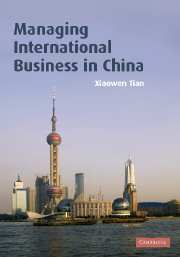Book contents
- Frontmatter
- Contents
- List of figures
- List of tables
- List of boxes
- Preface
- 1 Introduction
- 2 Look before you leap
- 3 Manage guanxi strategically
- 4 Select an entry mode
- 5 Form an alliance
- 6 Negotiating with Chinese partners
- 7 Production operations management
- 8 Marketing management
- 9 Human resource management
- 10 The protection of intellectual property rights
- 11 Corporate finance considerations
- References
- Index
- References
5 - Form an alliance
Published online by Cambridge University Press: 05 June 2012
- Frontmatter
- Contents
- List of figures
- List of tables
- List of boxes
- Preface
- 1 Introduction
- 2 Look before you leap
- 3 Manage guanxi strategically
- 4 Select an entry mode
- 5 Form an alliance
- 6 Negotiating with Chinese partners
- 7 Production operations management
- 8 Marketing management
- 9 Human resource management
- 10 The protection of intellectual property rights
- 11 Corporate finance considerations
- References
- Index
- References
Summary
While an independent effort may at first appear to be the most attractive option, few companies have the necessary resources, skills and capabilities to become viable go-it-alone competitors in China. An alliance with a Chinese company encompasses a broad range of potential collaboration from supply or marketing agreements to joint ventures. Although China alliances are risky and certainly face significant challenges, if properly designed and managed they are the most effective method for building and profiting from a competitive position in one of the world's toughest and most important markets (Pieter Klasas Jagersma (2002, p. 3)).
In the previous chapter we looked at different entry modes. In some of these entry modes, such as joint ventures, transnational corporations need to form an alliance with a local Chinese partner. In the contemporary world, of course, business alliances cover a wide range of forms and areas, and have now become ‘the normal way of doing business’ (Lasserre, 2003, p. 97). Given the difficulties in going it alone in China, in particular, it is often in the interests of TNCs to form business alliances with local Chinese partners. In this chapter we first introduce the typology of international business alliances in China, and then discuss the three most important issues of forming and managing an international business alliance in China: partner selection, control over the alliance and conflict management.
- Type
- Chapter
- Information
- Managing International Business in China , pp. 94 - 119Publisher: Cambridge University PressPrint publication year: 2007



